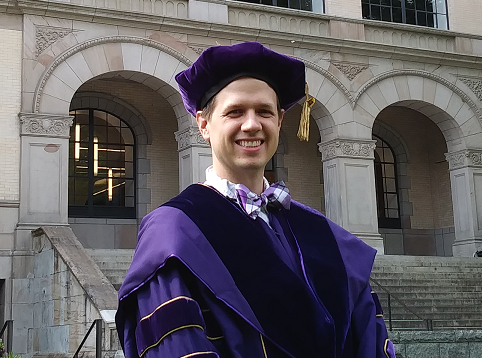A strange mixture of euphoria, exhaustion, relief, and melancholy has befallen me since I defended my dissertation last week. For those of you who have been through it all, you will know what I mean. It is wonderful and exhilarating to have reached this stage, but the time has come to leave the comfort of familiar surroundings, fantastic friends, and cordial colleagues, which is always a scary prospect. I will never forget those to whom I am so greatly indebted as I move on to new adventures. I am grateful to the UW Department of Germanics, its supporters, staff, faculty, and students for the multifarious ways they have fostered and nourished my academic pursuits. As I set forth into the unknown, I know that I can step forward with great confidence because of the training and encouragement I have received in this department.
For those of you unfamiliar with my work, my dissertation is titled “Mind-Crafting: Anticipatory Critique of Transhumanist Mind-Uploading in German High Modernist Novels.” In it, I attempt to answer how fictional minds inform artificial intelligence, or, more specifically, how German modernist novels help us avert the ascendancy of robotic thinking. The novels discussed in this work include Thomas Mann’s Der Zauberberg; Hermann Broch’s Die Schlafwandler; Alfred Döblin’s Berlin Alexanderplatz: Die Geschichte von Franz Biberkopf; and, in the conclusion, Irmgard Keun’s Das Kunstseidene Mädchen. In these novels, I found several aspects in fictional minds that resist the uploading of the mind, namely situatedness, plurality, and adaptability to ambiguity. From these aspects, something remains that confuses the algorithm, as my advisor, Richard Block, is fond of saying. I owe a considerable debt of gratitude to Richard for his confidence and guidance through the ups and downs of this ambitious project. Thank you for all your help!
At the University of Washington, I have had a variety of unforgettable and irreplaceable experiences. As a Max Kade Fellow at the University of Washington, I pursued research in posthumanism, transhumanism, continental philosophy, and German-language films and literature from a wide variety of time periods and genres. Under the tutelage of Eric Ames and Rick Gray, I honed my lecturing and teaching skills as an assistant TA in courses on Film Noir and Sigmund Freud. During a teaching exchange, I taught American culture and advanced English-language courses at the Sprachenzentrum of the Westfälische Wilhelms-Universität in Münster, Germany, which gave me an invaluable, inverse perspective into this profession. Kaffeestunde and the German film series were priceless opportunities to interact with our wonderful students and help build the community of German learning at the University of Washington. As the 2018 recipient of the Manfred Bansleben Award for excellence in teaching, I must recognize the excellent example of my mentor, Klaus Brandl, whose teachings and insights will be a part of me wherever I go. I would also like to thank all my fellow graduate students, who were more than colleagues but also friends in times of need.
Where the future will take me is yet to be determined. I have interviewed at various universities and am hoping to have good news to share in the coming weeks.
